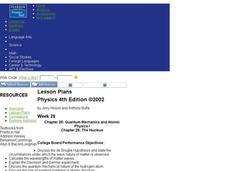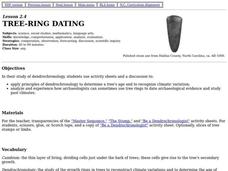Curated OER
Spectral Surprise
Learners experience a model that produces, separating, and displaying spectral colors.
Curated OER
Collecting Electromagnetic Radiation
Pupils using different experiments and activities explore electromagnetic radiation and the effect on the Earth.
Curated OER
Cloud Shadows
Students classify clouds as transparent, translucent or opaque. They conduct an experiment to determine the visual opacity of several classroom objects and then conduct further observations of clouds.
Curated OER
Physics- global warming
Students discuss the concept of global warming and view a multimedia clip on the global warming phenomenon. They statistically analyze mean temperature data and compare a given set of data. Data on atmospheric CO2 is done then they...
Curated OER
Sea Ice Research
Students study sea ice and its importance in climate and climate change. They discuss sea ice as a presence of a food source for marine animals in the arctic and complete a lab activity. After completing the lab, they watch a video...
Curated OER
Flower Pigments
Middle schoolers experiment with Thin Layer Chromatography to separate pigments found in flower petals.
Curated OER
Chloroplasts and Pigments
In this plant pigments worksheet, students compare the function of 3 types of pigments: chlorophylls, carotenoids, and phycobilins. This worksheet has 23 fill in the blank, 3 drawing, and 2 short answer questions.
Curated OER
INFRARED OLD FAITHFUL
Middle schoolers view video clips and still images of Old Faithful and review the main questions and curiosities regarding Old Faithful. They break into groups and take on the roles of explorers and have come upon this interesting...
Curated OER
Jupiter's Moons
Students predict which of Jupiter's moons will be the "brightest" in infrared wavelengths. Using provided information, they rank the moos from brightes to faintest in infrared.
Curated OER
Finding Jupiter's Moons
Students explore Jupiter's Moons. They calculate and predict the location of Jupiter's 4 large moons. In addition, they draw Jupiter with its moons correctly shown for the time of the observation.
Curated OER
Sunspots: Correlating Sunspots to Active Regions
Students investigate sunspots. They use solar imaging from satellite instruments which are currently circling the sun. Students compare images from the satellites and determine the existence of a correlation between the two types of...
Curated OER
Cloud Observation and Graphing
Students identify the three major cloud groups. They are introduced to the three main cloud types and spend a week making and recording observations of clouds. Students produce a graph that presents their findings and conduct research...
Curated OER
Using Maps To Make Public Health Decisions Case Study: Wildfires in Mexico 2000
High schoolers study environmental health. Using actual NOAA satellite imagery, students investigate the basic concepts of mapping. They explore the relationship between monitoring satellite images and public health decision making.
Curated OER
Quantum Mechanics and Atomic Physics
Students will discuss the de Brogile Hypothesis and state the circumstances under which the wave nature of matter is observed. They will also calculate the wavelengths of matter waves.
Curated OER
Roaming Biomes
Students use the Internet to research the capabilities of earth-observation satellites. Using the information, they write a report on how remote-sensing technology is used to measure the impact of climate change. They identify the...
Curated OER
Electrons and Atoms
In this atoms worksheet, students determine the velocity, wavelength, power, and frequency of given atoms. Student describe wave-particle duality and give the principle and angular quantum numbers for given orbitals. This worksheet has...
Curated OER
Greenhouse Effect: Pop Bottle Experiment
Students explore global warming by conducting a weather experiment. In this greenhouse gas lesson, students define the greenhouse effect and the impact on our ozone layer. Students utilize a soda pop bottle, floodlight bulb, thermometers...
Curated OER
Day and Night
Students using experiments try to demonstrate how observations can be affected by the cycles of night and day.
Curated OER
and and Ocean Views of Earth by Remote Sensing
Students explain how satellites help scientists to see more than with the unaided eye and how Landsat technology works. Students identify vegetation and fire sites in the rainforest and detect erosion along rivers. They are able to use...
Curated OER
Tree-ring Dating
Learners complete activity sheets and participate in discussions while they study dendrochronology. They determine a tree's age and recognize how the climate varied over time.
Curated OER
The Human Cheek Cell
Students list the parts of cell theory and describe and define vocabulary. In this cell lesson plan students complete a handout that includes sketching a cell.
Curated OER
Mechanical, Electrical and Radiant Energy
Young scholars write a hypothesis and complete a lab. In this investigative lesson plan students complete their lab and a worksheet about energy.
Curated OER
A Galactic Fact Sheet
In this galactic fact worksheet, learners read through important facts about galaxies, their shapes, and distances from the Sun.
Curated OER
Physical and Chemical Changes
Eighth graders view a PowerPoint presentation that assist them in distinguishing between physical and chemical changes. They compare their observations of demonstrations to a list of clues recognizing types of changes.

























